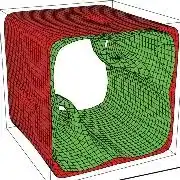افشین رشید
اُستادیار ؛ عضو هیات علمی دانشگاه آزاد اسلامی واحد علوم و تحقیقات تهران
651 یادداشت منتشر شدهEmergence of Quantum Effects in Nanotransistors

Note: The emergence of quantum effects as the dimensions of the transistor shrink and enter the range below 100 nm, the behavior of individual atoms gradually becomes significant and important.
According to the dimensions of the silicon atom, which is about 1.46 angstroms (0.146 nm) and taking into account the distance of inter-atomic bonds, we come to the conclusion that when we are in dimensions below 100 nm, with only a few tens of silicon atoms We are busy. Decreasing the number of silicon atoms in the transistor causes the problem of crystalline defects to become a serious challenge. Because a small defect in the crystal, either caused by silicon atoms or impurity atoms added to silicon, will cause many changes in the electrical behavior of the transistor and remove the transistor from its intended use.

By reducing all the horizontal and vertical dimensions of the transistor, the electric charge density increases in different areas of the nano-transistor, or in other words, the number of electric charges per unit area of the nano-transistor increases. This event has two negative consequences: First, with the increase in electric charge density, the possibility of electric charge discharge from the insulating areas of the transistor increases, and this event causes damage to the transistor and its failure. This event is similar to the discharge of excess electric charge between the cloud and the ground in the phenomenon of lightning, which causes the ionization of air molecules into negative and positive ions. Secondly , with the increase of the electric charge density, the electrons may leave the range of the radius of one atom and enter the range of the radius of the adjacent atom under the influence of repulsive or abduction forces, which have now increased in value. This is called tunneling in quantum physics. Electron tunneling from one atom to the adjacent atom is a phenomenon that happens a lot between electrons in small dimensions. This phenomenon is the basis of some electronic components and some nanoscopes. But in nanotransistor, this phenomenon is not a useful phenomenon, because electron tunneling from one atom to the adjacent atom may continue and cause an electric current. Although this electric current may be very small, but because it is unwanted and unanticipated, it acts as a leakage path for electric current and changes the electrical behavior of the nano-transistor.
Conclusion:
Minimizing transistors and entering dimensions below 100 nanometers in the performance range of nanoelectronics technology, although it has many advantages, but it faces various challenges.